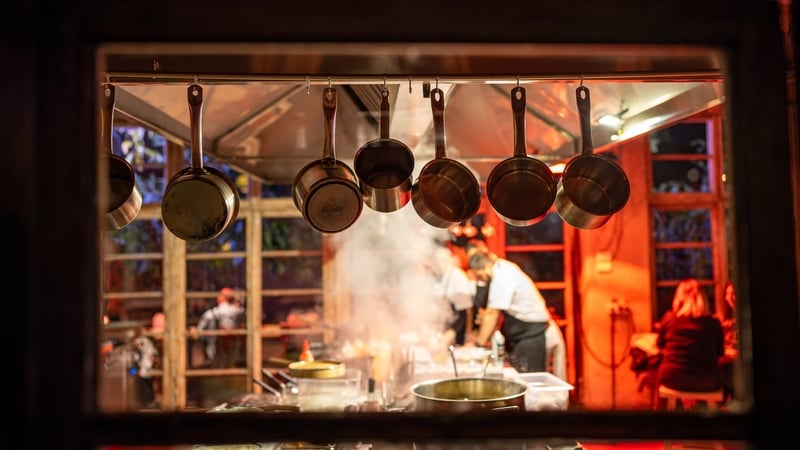Analysis: It would not be an easy task, but it would be much better than giving up to 35% commission on sales to global delivery giants
While the Government considers reducing VAT from 13.5% to 9% at a cost of €675 million to support restaurants and cafés, economic commentators have questioned whether global corporations like McDonald’s need the same relief as struggling local independents. But this debate has missed a more fundamental issue: both have the same damaging relationship with delivery platforms which are draining 25 to 35% commissions from food delivery orders (notwithstanding some local Irish platforms charging a somewhat more reasonable 17.5% commission).
Rather than broad-based tax relief benefiting large multinationals alongside local restaurants, Ireland could explore cooperative alternatives that address such structural problems facing independent establishments. My recent analysis of the impact of delivery platforms on Irish restaurants highlights that the challenge isn’t necessarily the service itself, but rather the current economic model that extracts substantial commissions from businesses operating on 3 to 5% margins.
We need your consent to load this rte-player contentWe use rte-player to manage extra content that can set cookies on your device and collect data about your activity. Please review their details and accept them to load the content.Manage Preferences
From RTÉ Radio 1’s This Week, do you know how much your delivery driver will make from your takeaway order?
Ireland has a deep history of cooperative solutions to promote economic democracy, and across Europe, modern cooperative alternatives demonstrate that different models are not only possible but sustainable. An Irish platform cooperative could offer an alternative that keeps revenues within the industry while improving working conditions and restaurant economics, creating meaningful change that adapts to how people eat.
The hard truths
Any honest assessment must acknowledge that building a platform cooperative to compete with global technology giants represents an enormous challenge. Ubiquitous platforms such as Deliveroo and Uber Eats benefit from massive network effects. Customers want maximum restaurant choice, restaurants need maximum customer reach and efficiency requires the density that comes with scale. A cooperative starting small faces the classic chicken-and-egg problem: how do you attract customers without restaurants, and restaurants without customers?
The technical requirements are also substantial. Modern delivery platforms represent sophisticated technology investments involving real-time logistics optimisation, payment security systems, fraud prevention, multi-platform mobile development, and machine learning algorithms. The major platforms have invested hundreds of millions in developing these capabilities over many years. A cooperative cannot simply replicate this overnight with modest budgets and good intentions.
We need your consent to load this rte-player contentWe use rte-player to manage extra content that can set cookies on your device and collect data about your activity. Please review their details and accept them to load the content.Manage Preferences
From RTÉ Radio 1’s Drivetime, a new report from the Restaurants Association of Ireland claims many more food businesses will close without the return of a 9% VAT rate
Moreover, the economics are more complex than eliminating shareholder profits. Platform operations involve significant costs, including technology development, customer acquisition, payment processing fees, insurance, regulatory compliance, and customer service infrastructure. Cooperative platforms require sustainable revenue models that cover these substantial operational requirements.
The Financial Times estimates that the four largest standalone platforms in Europe and the US (Deliveroo, Just Eat, Delivery Hero and DoorDash) made cumulative annual losses of over $20 billion between 2017 and 2023. This demonstrates the unsustainable nature of current business models that rely on venture capital subsidies to maintain artificially low prices while charging restaurants eye-watering commission rates.
Could Irish restaurants succeed in going it alone?
Despite these challenges, Ireland possesses several unique advantages that could enable success where other markets might fail. The country’s compact geography and concentrated urban population create optimal conditions for achieving the density needed for efficient operations. Ireland’s national market remains manageable enough for coordinated development strategies.
We need your consent to load this rte-player contentWe use rte-player to manage extra content that can set cookies on your device and collect data about your activity. Please review their details and accept them to load the content.Manage Preferences
From RTÉ Radio 1’s Today with Claire Byrne, why are so many restaurants closing down?
Ireland’s cooperative traditions provide critical institutional knowledge and cultural acceptance for alternative business models. The Irish Co-operative Organisation Society (ICOS) represents 1,000 co-ops in Ireland with €16 billion turnover and 175,000+ members, demonstrating the scale and success of cooperative enterprise in the Irish economy. Credit unions serve over 3.6 million members, demonstrating consumer appetite for cooperative services. More importantly, the current crisis creates the catalytic moment needed for collective action. When individual survival is at stake, restaurants may be willing to overcome competitive instincts to pursue collaborative solutions.
The existing technological infrastructure and high digital adoption rates provide foundational capabilities, while Ireland’s tech sector offers potential access to development expertise. Perhaps most crucially, the mathematical impossibility of current commission structures creates powerful incentives for change that didn’t exist in more stable market conditions.
The most significant European platform cooperative success story is CoopCycle, a federation of 70+ bike delivery cooperatives operating across multiple European cities using shared open-source technology. Members pay just €49 monthly in their first year, then 2% of revenue thereafter—dramatically lower than conventional platform commissions. Companies like Manna Aero are already pioneering drone delivery services in Ireland, potentially offering cooperative platforms technological advantages that offset scale disadvantages.
We need your consent to load this rte-player contentWe use rte-player to manage extra content that can set cookies on your device and collect data about your activity. Please review their details and accept them to load the content.Manage Preferences
From RTÉ Radio 1’s This Week, are food delivery drones delivering dinner or disturbance?
How to put this system together
Success requires acknowledging limitations while building systematically toward critical mass. Rather than attempting to replicate full platform functionality immediately, a cooperative could begin with specific market segments where network effects matter less and relationship quality matters more. Premium dining experiences, locally-sourced food networks or speciality cuisine providers might value cooperative principles enough to accept initially limited customer reach.
The technology development should follow modular principles, starting with basic functionality and expanding based on member needs and available resources. CoopCycle’s open-source development frameworks and cloud computing infrastructure reduce initial capital requirements, while partnerships with Irish software companies could provide development expertise in exchange for equity stakes or preferred supplier arrangements.
What are the challenges around co-ops like this?
Restaurant cooperation faces genuine obstacles including competitive relationships, different operational needs and free-rider problems. Academic research analysing 48 European platform cooperatives found that successful cooperatives develop sophisticated approaches to balancing worker ownership with competitive viability, though they face significant challenges in raising capital and making collective decisions.
Creating a restaurant delivery cooperative is not a quick-fix solution
Success requires governance structures that balance democratic participation with operational efficiency, possibly through tiered membership levels reflecting different contribution and commitment levels. Barcelona’s Mensakas cooperative, which specialises in last-mile delivery for local cultural centres and businesses rather than mainstream chains, demonstrates that cooperatives can build sustainable alternatives through strategic partnerships with local institutions and the social economy.
An Irish cooperative could begin with a core group of committed founding members who provide initial capital and governance leadership, gradually expanding to include additional restaurants as the platform demonstrates viability. Clear contractual commitments regarding participation levels, data sharing, and exclusivity periods could reduce uncertainty while building trust among members.
Professional management, rather than purely democratic decision-making, would be fundamental for day-to-day operations. The cooperative structure provides oversight and strategic direction, but operational decisions need professional expertise rather than committee deliberation.
We need your consent to load this rte-player contentWe use rte-player to manage extra content that can set cookies on your device and collect data about your activity. Please review their details and accept them to load the content.Manage Preferences
From RTÉ Radio 1’s Drivetime, how recyclable are your takeaway containers?
The co-op’s unique selling points
Rather than competing directly on convenience and selection, the cooperative could differentiate through values that resonate with growing consumer segments. Emphasis on local ownership, fair employment practices, data privacy and community investment could attract customers willing to accept somewhat limited initial selection in exchange for supporting local businesses.
Workers could benefit from democratic control over technological features and job structures, plus access to social protections, including healthcare and sick leave through cooperative membership. The contrast is stark with current gig economy conditions where delivery workers are classified as independent contractors and receive no employment protections while bearing vehicle costs and income volatility. Such a cooperative could emphasise authenticity, community support, and ethical consumption rather than pure convenience.
Where would the initial hefty cash investment come from?
Initial capital requirements would likely to be substantial and potentially require several million euros for technology development, regulatory compliance and initial operations. This could come from member contributions, Irish development agencies or patient capital from impact investors.
We need your consent to load this rte-player contentWe use rte-player to manage extra content that can set cookies on your device and collect data about your activity. Please review their details and accept them to load the content.Manage Preferences
From RTÉ Brainstorm, how the Irish became food delivery pioneers in the 19th century
Access to capital represents a significant hurdle, as shared ownership prevents venture capital investment. Success metrics should emphasise member sustainability rather than rapid growth, measuring restaurant profitability and community economic impact alongside traditional business indicators.
Policy support
Ireland’s existing cooperative infrastructure provides immediate advantages for platform cooperative development. The Industrial and Provident Societies Act offers established legal frameworks for cooperative incorporation, while the OECD recommends government support mechanisms including procurement policies favouring platform cooperatives and public lending for early-stage financing.
EU support through the Platform Work Directive (2024) potentially levels the playing field by requiring proper worker classification, removing the cost advantage that conventional platforms gain through misclassifying employees as independent contractors.
What would success look like?
Creating a restaurant delivery cooperative is not a quick-fix solution. Network effects, technical complexity, financial requirements, and competitive responses represent genuine obstacles that have defeated similar attempts elsewhere. Existing platforms won’t ignore cooperative threats and could respond with predatory pricing or exclusive deals, while legal and regulatory compliance requires professional expertise from the outset.
From RTÉ Prime Time, what is behind the growing number of restaurant closures in Ireland?
However, the current unsustainable economics of platform relationships—demonstrated by the $20 billion cumulative losses of major platforms while they extract unsustainable commissions from restaurants—combined with Ireland’s potential advantages create conditions where such an experiment might succeed if approached with appropriate realism and resources. The goal shouldn’t be immediate disruption of existing platforms, but rather demonstration that alternative models can provide viable options for restaurants willing to invest in cooperative ownership.
Success would require exceptional commitment from founding members, professional management, adequate capitalisation, and realistic timelines extending over several years. Even then, success isn’t guaranteed. But given the continued erosion of restaurant viability under current platform models, the experiment may be worth attempting.
The Restaurants Association of Ireland could commission a comprehensive feasibility study to create the roadmap for Ireland’s first restaurant delivery cooperative. The current situation needs solutions, not cautious incrementalism. Ireland has the cooperative tradition, technological capability and economic imperative to pioneer an alternative that other countries could follow. The question isn’t whether this represents a risk, but whether Ireland will take the opportunity to transform platform relationships from extraction into community wealth building, thereby demonstrating that restaurants can reclaim control of their future.
Follow RTÉ Brainstorm on WhatsApp and Instagram for more stories and updates
The views expressed here are those of the author and do not represent or reflect the views of RTÉ




